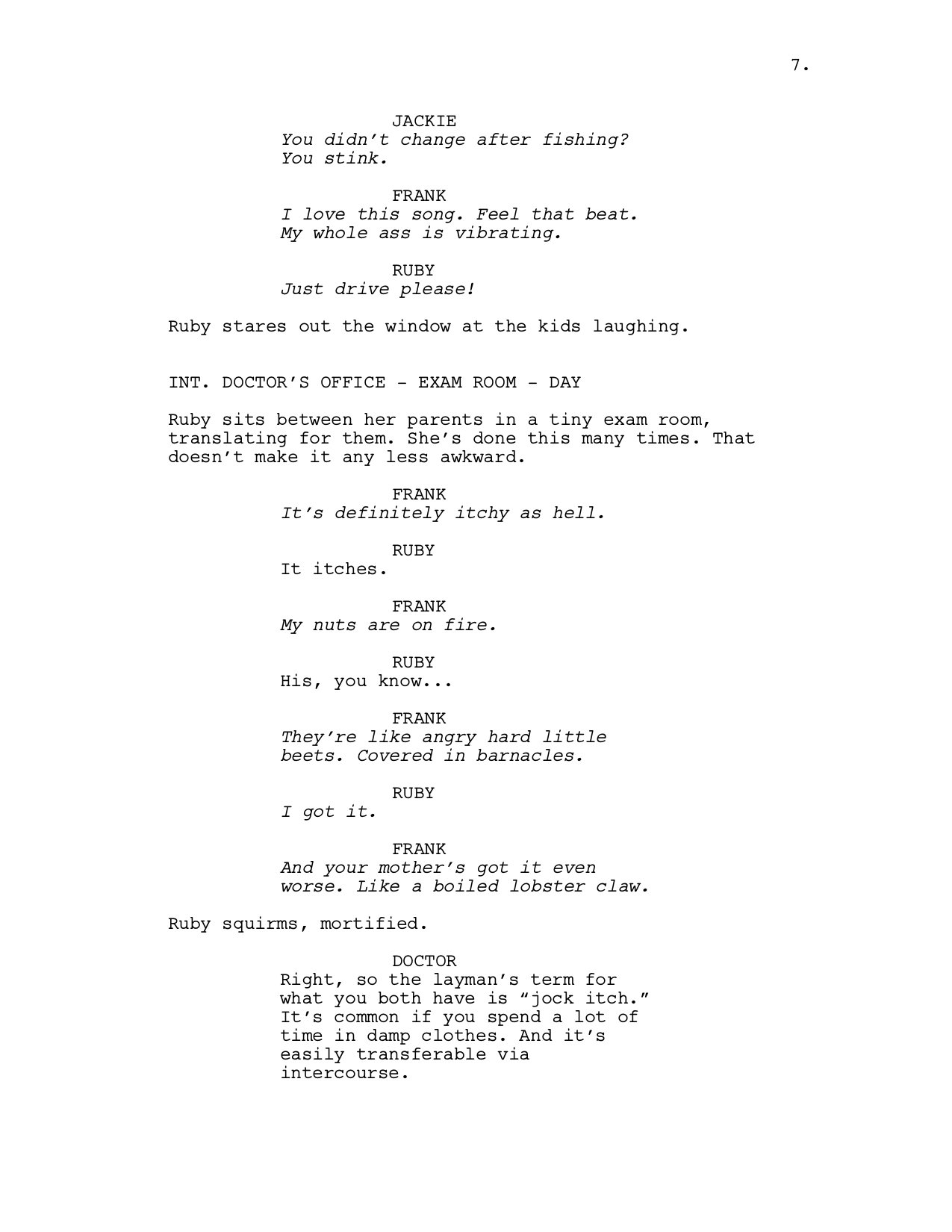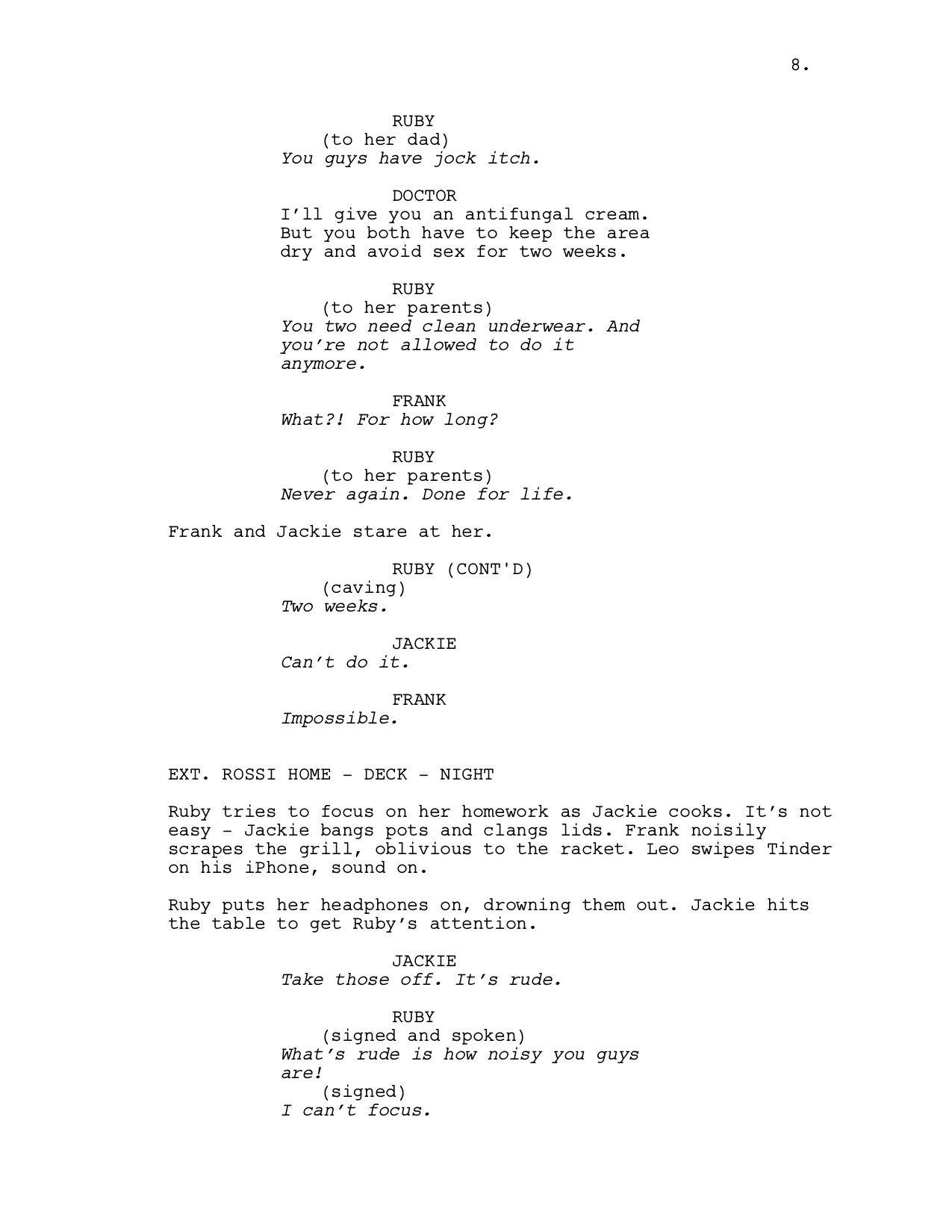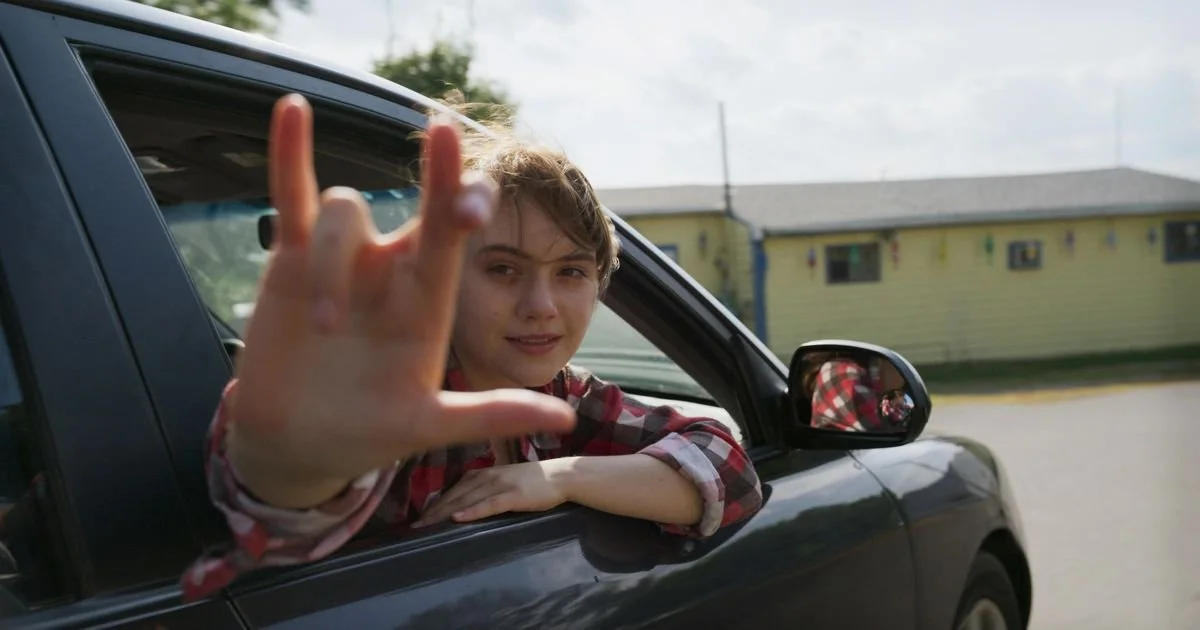Screenplay Breakdown: CODA
A lot happened at the 2022 Academy Awards . . . but in this piece, we’re going to focus on CODA (2021). A stand out film this awards season, CODA (2021) is written and directed by Sian Heder. It has been praised for its representation of the deaf community through its writing and casting. The film took home Best Supporting Actor, Best Adapted Screenplay, and what some would say is the most coveted award of the night: Best Picture. It is a touching-heartwarming story of family and coming of age. The film’s success marks a significant moment in film history and will hopefully allow for more representation moving forward. In addition, the film’s win of Best Picture marks the first time that a streaming platform has ever won that award— a turning point in the film industry. CODA is available to stream on Apple TV+ and the full screenplay can be accessed here.
CODA (2021)
written and directed by Sian Heder
A Brief Synopsis:
Ruby Rossi, a CODA (Child of Deaf Adults) and only hearing member of her family, spends her mornings before high school working on a fishing boat with her father and brother. When she joins her school’s choir, she uncovers her love for singing. Impressed by her natural talent, her choir teacher gives her private lessons to prepare her for an audition for Berklee College of Music. As she considers a future in music, she grapples with the reality of not always being by her family’s side. With her family’s business facing new obstacles, she is torn between both commitments.
Getting it Made:
The Vanity Fair article, “How CODA’s Groundbreaking, Powerhouse Cast Came Together,” discusses how the film came to be. CODA is adapted from the French film La Famille Bélier (2014). Lionsgate executive, Patrick Wachsberger, became interested in adapting it in America and acquired the rights from Philippe Rousselet. Sian Heder was brought on as the writer and director. While the original French film was extremely successful and beloved, its lead actors were not deaf. This is something both Heder and Wachsberger wanted to change with their adaptation. Academy Award winner, Marlee Matlin, was cast early on. Issues arose when the studio wanted hearing actors to play Frank and Leo. When Matlin heard about the direction the studio wanted to go, she threatened to walk. Patrick Wachsberger realized Lionsgate was not a good fit for the film, so he decided to leave with the film in 2018. Without studio interference, they were able to properly make the film they initially wanted. They cast deaf actors who could truly understand and connect to the characters with Matlin giving them her stamp of approval.
Element Breakdown:
Conflict/Goal
Ruby’s family is struggling to make ends meet with their fishing business. As new fees and regulations make it increasingly difficult for local fishermen to make a profit, Frank decides they will sell their own fish. The other fishermen agree to join in. It is a massive undertaking for the family and they rely on Ruby to interact with the community on their behalf. She struggles to balance her family’s business and her new pursuits in music. Unable to hear her sing, her family has trouble believing in her talent and true potential. If she follows her own path, she risks the possibility of her family’s business failing. While she wants to support and protect her family, she can't help but want to put herself first for once. Both Ruby and her family must learn to go outside of their comfort zones.
From CODA on Apple TV+
Pacing:
The film opens with Ruby working on the boat with her father, Frank, and brother, Leo. She happily sings, hinting at her hidden passion. Someone calls in on the radio, which Ruby has to answer due to her being the only one who can hear it. By throwing us right into this family and their dynamic, we are able to connect to them immediately. It establishes their everyday life, which will soon be disrupted. When they sell their fish, they express frustration with the declining rates they are getting for their catch. The film’s conflict is set up early and becomes further complicated when Ruby begins focusing on singing. The stakes gradually build as her two worlds pile up. We see her trying to manage both, feeling the pressure and exhaustion she is under until it comes to a head at the climax. By the time it reaches this point, we have developed a true sense of how high the stakes are for this family.
Characters’ Voices:
The Rossi family dynamic jumps off the page. They bicker and tease each other, but there is clear love between them without it feeling forced. While they have a close bond, they are still their own people with their own distinct voices. When Ruby is around her family, she is witty and headstrong. She is not afraid to express her embarrassment over Frank's inappropriate jokes or Jackie's pestering comments. While in school, she is more reserved. She has interpreted for her family her entire life, giving her a level of maturity other teenagers may not possess. With this responsibility, she often feels eyes and judgement fall on her. Because of this she tries to blend into the background while around other teenagers. This shows how people shift their demeanors in different environments. In their town, Ruby and her family feel like outsiders. Their home is where they can be themselves and show their true personalities
Action Descriptions:
The action lines are utilized in this film to show rather than tell the audience what the characters are feeling. Early on, Ruby has a shy demeanor. This gradually diminishes when she gets more comfortable with her singing. As she grows as a singer, the way she carries herself becomes more confident. An obstacle Ruby has to overcome is winning over her father’s support. At Ruby’s choir concert, her family appears slightly bored. While she is singing her duet, the perspective shifts. The action line, “we hear ONLY SILENCE. They watch Ruby’s lips move, but no sound comes out” allows us to experience it from their point of view. As they look around at the audience, they take in the emotions of everyone watching. In this moment they begin to recognize her talent through the reactions of others. After Ruby’s concert, Frank asks her to sing for him. As she sings, he puts his hand to her throat to feel the vibrations. This simple action shows Frank’s love for his daughter as he finds his own way of understanding her passion
Favorite Lines:
“Because Tinder is something we can all do as a family.” – Jackie Rossie
“I’ve never done anything without my family before.” – Ruby Rossie
A page-to-screen scene comparison:
In this scene, Ruby goes to her parents’ doctor’s appointment and interprets for them.






